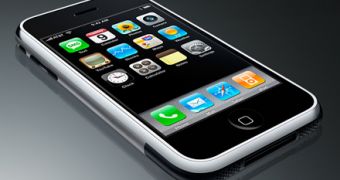iPhone users are suffering from delusion similar to the Stockholm Syndrome, according to research done by Strand Consult. The Stockholm Syndrome is usually described as a psychological response seen in abducted hostages where they show signs of loyalty to the kidnapper.
Titled “How will psychologists describe the iPhone syndrome in the future?” the report begins by saying, “It is no secret that there has been a great deal of hype surrounding the iPhone and it is also no secret that Apple probably has the most loyal and fantastic customers in the world.” Strand Consult continues by suggesting that iPhone users are blindly “defending” the product, “despite the shortcomings and limitations of both past and present versions of the iPhone.”
Softpedia note
Although some may disagree, we’d say Strand may have something here. That doesn’t make Apple, or the iPhone bad. No one said they were perfect. OK, let’s move on and see if we can continue to agree with its analysis.
“Apple has launched a beautiful phone with a fantastic user interface that has had a number of technological shortcomings that many iPhone users have accepted and defended, despite those shortcomings resulting in limitations in iPhone users’ daily lives,” the report reads. “When we examine the iPhone users’ arguments defending the iPhone, it reminds us of the famous Stockholm Syndrome – a term that was invented by psychologists after a hostage drama in Stockholm,” Strand boldly states. “Here hostages reacted to the psychological pressure they were experiencing, by defending the people that had held them hostage for 6 days,” it says.
Softpedia note
Does this sound a bit stretched? Maybe... Or maybe not! The syndrome is named after the Norrmalmstorg robbery of Kreditbanken at Norrmalmstorg in Stockholm (just so everyone is on the same level here), in which the bank robbers held bank employees hostage for six days. This happened in ‘73, by the way. As the story goes, the victims became emotionally attached to their captors after they were freed from their six-day ordeal, and even defended them.
There’s a psychological explanation for this, of course. It has been found that, once a person becomes unhappy over a long period of time (kidnapping or hostage-taking situations being the perfect example), that person is faced with resolving what is known as a “cognitive dissonance.” In the case of a kidnapping, it has been found that the victim may begin to identify with the captor(s).
Comparing this with the time when people started cheering and throwing their hats in the air as Apple announced that copy / paste and MMS were finally going to be supported in iPhone OS 3.0, we’d say (again) that Strand Consult pretty much nailed it.
When Apple made the big (OS 3.0) announcement, other smartphone owners out there were long enjoying these features. Apple was actually able to deliver only when its second iPhone (3G) was out (of course, the iPhone had lots of stuff that other smartphones didn’t, but that’s another story). Naturally, those already hooked on the device could only explode with joy when iPhone OS 3.0 finally arrived with the goods. So, yes, we agree that it makes sense to compare. Do iPhone fans actually suffer from the respective syndrome? Well, that’s arguable.

 14 DAY TRIAL //
14 DAY TRIAL //